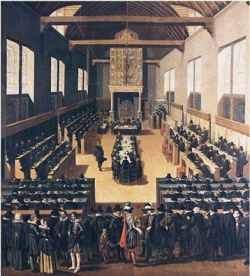The Canons of Dort, First Head of Doctrine, Article 4
 Thursday, December 27, 2007 at 08:15AM
Thursday, December 27, 2007 at 08:15AM  Article 4: A Twofold Response to the Gospel
Article 4: A Twofold Response to the Gospel
God's anger remains on those who do not believe this gospel. But those who do accept it and embrace Jesus the Savior with a true and living faith are delivered through him from God's anger and from destruction, and receive the gift of eternal life.
_____________________________________
The Scriptures are very clear about human guilt before God and the Canons effectively summarize these verses. The wrath of God abides on all of those apart from Christ. There is a heaven to gain and a hell to shun.
As John says in his gospel, “Whoever believes in the Son has eternal life; whoever does not obey the Son shall not see life, but the wrath of God remains on him (John 3:36).” We cannot offer the false hope, however sincere, to those apart from Christ that “God loves you and has a wonderful plan for your life” as we find it in the Four Spiritual Laws. This promise is true, but only for a believer. Those apart from Christ know no such hope. They can only expect God’s wrath. That is why such people need to hear the law, and thereby be stripped of all false hope of personal righteousness which can stand on the day of judgment.
As Paul puts it so clearly in Romans 5:1 ff:
Therefore, since we have been justified by faith, we have peace with God through our Lord Jesus Christ. 2 Through him we have also obtained access by faith into this grace in which we stand, and we rejoice in hope of the glory of God. 3 More than that, we rejoice in our sufferings, knowing that suffering produces endurance, 4 and endurance produces character, and character produces hope, 5 and hope does not put us to shame, because God's love has been poured into our hearts through the Holy Spirit who has been given to us. 6 For while we were still weak, at the right time Christ died for the ungodly. 7 For one will scarcely die for a righteous person—though perhaps for a good person one would dare even to die— 8 but God shows his love for us in that while we were still sinners, Christ died for us. 9 Since, therefore, we have now been justified by his blood, much more shall we be saved by him from the wrath of God. 10 For if while we were enemies we were reconciled to God by the death of his Son, much more, now that we are reconciled, shall we be saved by his life. 11 More than that, we also rejoice in God through our Lord Jesus Christ, through whom we have now received reconciliation.
In this passage, Paul sets out the glorious promise that while we were sinners and unable to do anything to save ourselves, God sought us in Christ, taking away the guilt of our sin, which was the very ground of God’s estrangement from us. Remove the basis for God’s anger toward sinners and peace can be restored. This is why it is only in Christ that God saves us from his own wrath, and it is through the death of Christ that he reconciles himself to us and then us to him once the guilt of our sin is removed. This is what it means to have peace with God. The war between sinners and God is over.
But those who are not Christ’s know no such peace and it is not right to hold out false assurances to them. Theirs is but the pursuit of the passing pleasures of sin. Theirs is but the false wisdom of this present evil age. They are without hope and without God in the world. They are separate from Christ and foreigners to the covenant of promise (Ephesians 2:11-22). The wrath of God abides on them (John 3:36). There is no more horrible state imaginable then that which results from human sinfulness and not believing the gospel of Jesus Christ.
For the Christian, it is not the law (and the word of condemnation), but the gospel (the word of promise) that has the last word. Let us never forget that those who are Christ’s through faith are heirs to all of the promises of God. For in Christ we are given eternal life, we are justified and can know our sins are forgiven—no matter how great the guilt of them seems to us. In Christ, we are adopted as God’s sons and daughters and in Christ we will inherit all the riches that are found in him. In Christ, therefore, we live and die in the unspeakable comfort of the hope of heaven.
All that we must to is receive that which God offers to us in his son with the empty hands of a living faith by simply trusting that the son of God loved us and gave himself for us to reconcile us to God.


Reader Comments (1)